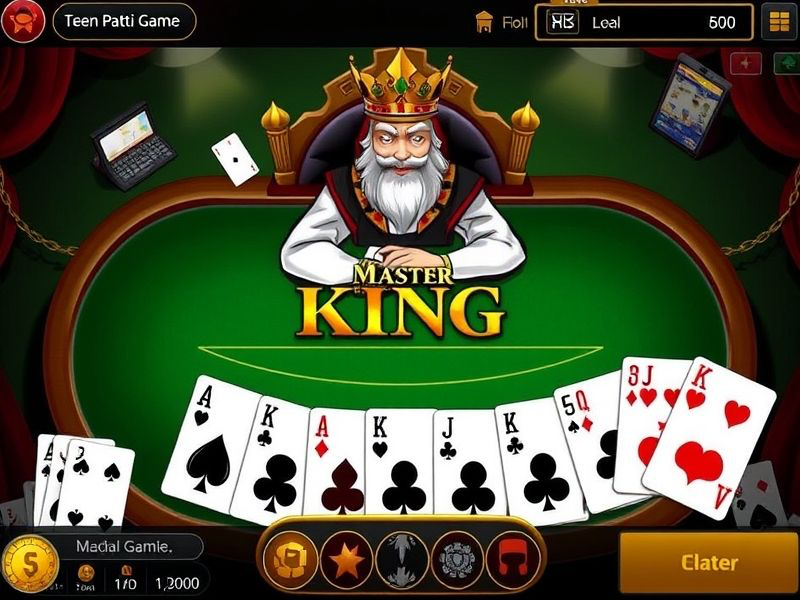
teen patti master king - Responsible Gaming
From the Poker Table to Life: Mastering the Balance Between Gaming and Finance
In a world brimming with endless possibilities, each of us is akin to a player at a poker table, where every decision could dictate our fate. Today, I wish to share insights on how to find that balance—enjoying the thrill of the game without compromising our financial stability. As a psychology doctorate, I deeply understand the intricate link between emotions and decision-making. Hence, today's discussion transcends a mere gaming strategy; it's a comprehensive guide to mastering your emotions and finances in the gaming arena.
Why Balancing Gaming with Finance is Essential?
Firstly, it's crucial to recognize that gaming is not just a form of entertainment but also a mirror reflecting our emotional and psychological states. Becoming engrossed in games often signifies an escape from real-life pressures and challenges, or a craving for the sense of achievement and fulfillment games offer. However, this escapism and over-reliance on gaming can lead to heightened anxiety and unrest. Therefore, learning to balance gaming with finance is not merely about safeguarding our financial health but also about preserving our mental peace and well-being.
From the Poker Table to Life: Setting Reasonable Betting Limits
Setting a reasonable betting limit at the poker table is akin to fortifying one’s emotional and financial defenses. By clearly defining the loss threshold we can bear, we maintain composure and avoid impulsive decisions driven by the desire to win. Similarly, in life’s poker game, we need to establish boundaries—be it financial budgets or time constraints—to ensure rationality and calmness.
Here’s how to set a reasonable betting limit:

- Understand Your Financial Situation: Before diving into gaming, take a few moments to assess your financial status. Jot down your monthly income, fixed expenses, and disposable income. This clarity will help you discern the financial risks you can afford.
- Set a Specific Monetary Cap: Based on your financial assessment, set a pragmatic betting limit. For instance, if your disposable income is ₹3000, consider allocating 10% (₹300) for gaming. This way, even if you lose it all, your financial stability remains unscathed.
- Record Each Bet: Document every betting amount. This not only helps you track your spending habits but also aids in making more informed decisions during emotional highs. If you find yourself frequently exceeding the set limit, it’s time for introspection and adjustment.
Staying Calm in Gaming: Utilizing Built-in Timers
Using built-in timers during gaming sessions is like setting a time boundary to keep cool under pressure. Just as in life’s poker game, establishing time constraints ensures we stay rational and collected. Here’s what you can do:
- Set Game Time: Before starting, decide on a sensible gaming duration. You might choose to game for only 2 hours daily. This time cap prevents impulsive decisions even when adrenaline is high.
- Leverage Timer Alerts: Many gaming platforms offer built-in timers. Use these to remind yourself of your gaming duration. When the timer goes off, step away from the game to engage in other activities like a stroll or simple chores. This helps maintain your calm and ensures a balanced lifestyle.
- Regularly Review and Adjust: As your financial and emotional landscapes evolve, regularly revisiting and tweaking your gaming time limits is essential. For instance, if you notice increased emotional stability, extending gaming time may be reasonable; otherwise, it’s wise to reduce it.
Understanding Emotional Triggers: Mastering Your Emotions
In poker, emotional triggers are like hidden mines that can lead to impulsive decisions once activated. Recognizing and controlling these triggers is crucial for balancing gaming and finances. Here’s how:
- Identify Emotional Triggers: Start by pinpointing emotions that spur impulsive actions. Perhaps losing a game leads to frustration, or winning incites excitement. Awareness of these triggers is the first step to managing them.
- Develop Emotional Management Skills: Once aware, learn to manage these emotions. When frustrated, try relaxation techniques like deep breathing or meditation. When exhilarated, stay grounded and avoid hasty decisions.
- Seek Support: If emotional management proves challenging, reach out for help. Discuss your feelings with friends, family, or consult a psychologist for diverse perspectives and effective coping strategies.
From the Poker Table to Life: Balancing Gaming and Finance
Balancing gaming with finance at the poker table is not solely a skill but a lifestyle choice. It demands that we relish the joy of gaming while safeguarding psychological wellness and financial security. Similarly, in life’s broader game, we must balance varied roles and responsibilities to sustain a healthy equilibrium.
- Set Long-Term Goals: Establishing long-term goals at the poker table can aid in balancing gaming with finance. For example, aim to keep gaming expenses below 10% of your monthly disposable income over the next months. This strategy allows you to enjoy gaming while maintaining financial stability.
- Regularly Review and Adjust: As your financial and emotional states evolve, periodic reviews and adjustments to your gaming and financial strategies are imperative. Adjust your gaming budget accordingly—increase it when financial stability is high and decrease it when it’s tight.
- Cultivate Diverse Interests: Beyond gaming, nurturing other hobbies and interests can aid in balancing gaming with finance. Engage in sports, read books, or learn new skills to enrich your life and divert attention from gaming.
Closing Thoughts: Balancing Gaming with Finance for a Healthier Life
Balancing gaming with finance transcends skill—it’s a lifestyle necessity that ensures we relish gaming’s thrills while maintaining financial and mental health. By setting rational betting limits, utilizing timers, understanding emotional triggers, and defining long-term goals, we can better manage our emotions and finances, leading to a healthier and more joyful existence.
Let us journey from the poker table to broader life, discovering that balance—enhancing our gaming experiences, yet safeguarding our financial security and mental health.
